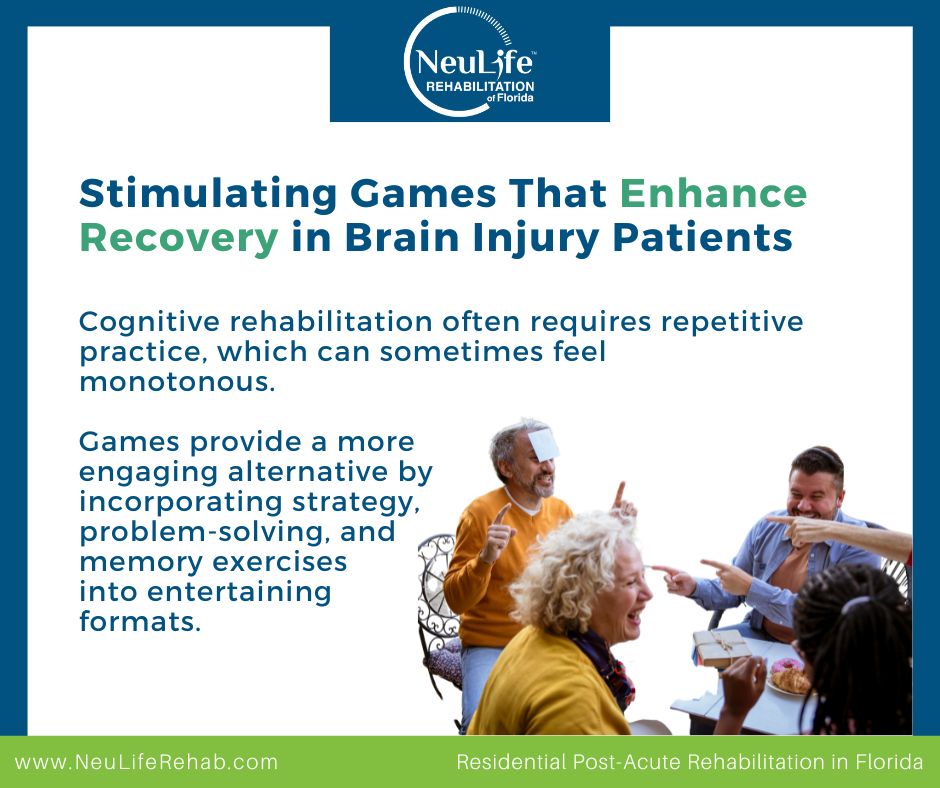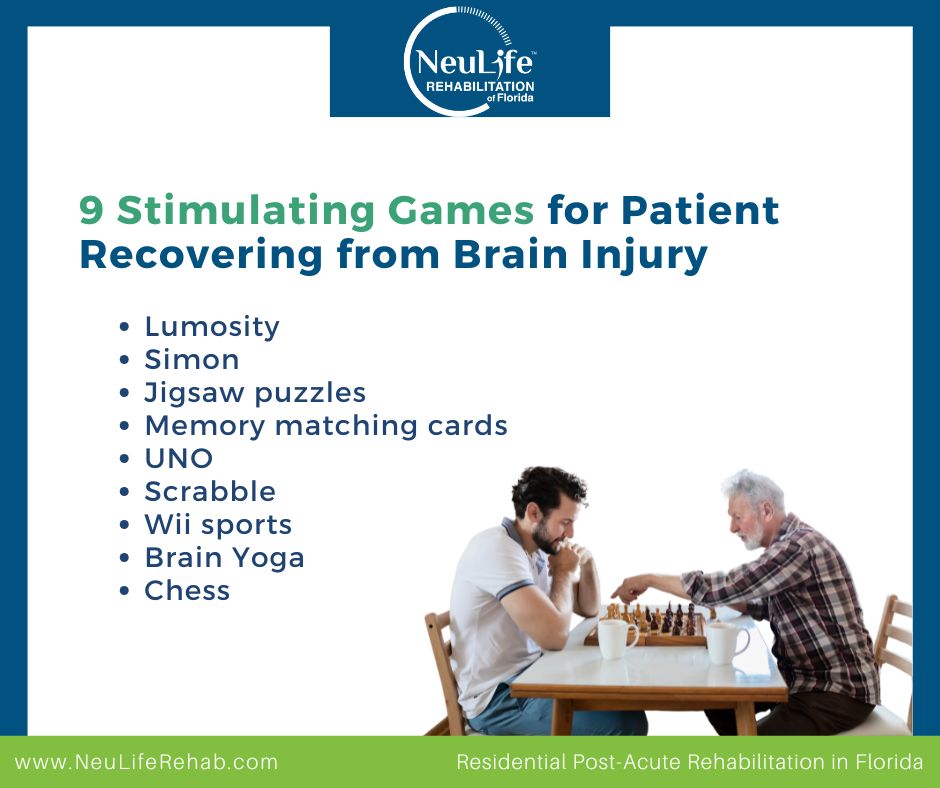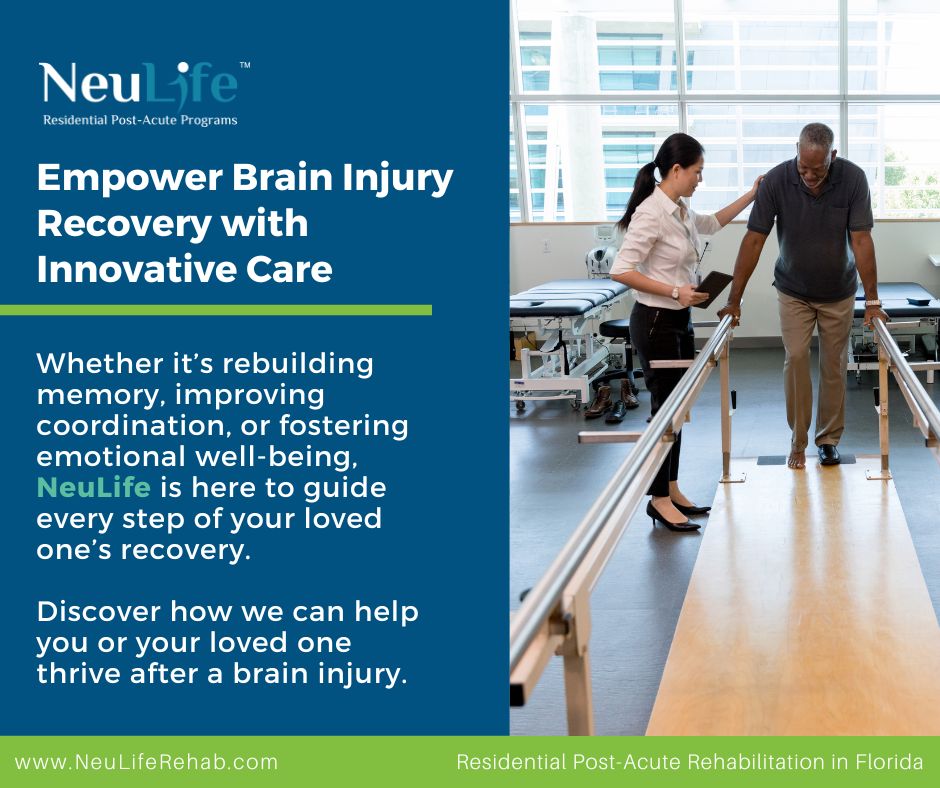Patients with TBI often face cognitive, physical, and emotional hurdles as they work to regain their independence and quality of life.

Fortunately, games designed to stimulate the brain can play a pivotal role in their recovery process. Not only do these games help patients rebuild critical cognitive functions, but they also provide a sense of accomplishment and fun.
Read on below to learn about nine engaging games that are ideal for enhancing brain injury recovery.
Games offer a unique and enjoyable way to stimulate the brain while addressing deficits caused by injury. Cognitive rehabilitation often requires repetitive practice, which can sometimes feel monotonous. Games provide a more engaging alternative by incorporating strategy, problem-solving, and memory exercises into entertaining formats.
By playing games, patients can target various cognitive functions, including:
Games also create opportunities for social interaction, reducing feelings of isolation and promoting emotional well-being. Overall, incorporating games into recovery plans can make rehabilitation more dynamic and effective.
Not all games are equally beneficial for brain injury recovery. When selecting games, it is essential to consider the following features:
Selecting games that meet these criteria ensures they will be both enjoyable and effective for rehabilitation.
Lumosity is an online platform offering a wide variety of brain-training games. These games target cognitive skills like memory, attention, and problem-solving through engaging timed challenges.

How it helps: Each game adapts to the user’s performance, ensuring a personalized experience that grows with their abilities. This progressive difficulty is excellent for brain injury patients, as it helps them steadily rebuild skills without feeling frustrated.
How to play: Patients can play Lumosity on a computer or mobile device. An example is “Speed Match,” where players quickly identify whether shapes match. Therapists can adjust session lengths or specific games to align with therapy goals.
Simon is a classic memory game that involves replicating increasingly complex patterns of lights and sounds. It’s simple yet highly effective for cognitive stimulation.
How it helps: This game targets short-term memory, attention, and pattern recognition, essential areas for brain injury recovery.
How to play: Players follow a sequence of flashing lights and sounds, repeating them in the same order. To adapt, caregivers can start with shorter sequences or provide verbal cues if needed.
Jigsaw puzzles involve assembling interlocking pieces to create a complete image. They come in various difficulty levels, making them accessible for all patients.
How it helps: Puzzles improve problem-solving skills, spatial awareness, and fine motor coordination, all crucial for brain recovery.
How to use: Start with puzzles containing fewer pieces and gradually increase the complexity as the patient progresses. Adaptive puzzles with larger or textured pieces are ideal for those with limited dexterity.
Memory matching games involve flipping over cards to find matching pairs. It’s simple, yet it provides a powerful cognitive workout.
How it helps: This game strengthens short-term memory, attention, and visual recognition.
How to play: Use decks with familiar themes or images (e.g., animals or shapes). Start with fewer pairs and increase the number as the patient’s memory improves. Caregivers can also assist by giving verbal prompts.
UNO is a popular card game where players match cards by color or number, aiming to be the first to discard all their cards.
How it helps: This game enhances color and number recognition, memory, and strategic thinking, all while promoting social interaction.
How to play: Players take turns matching a card from their hand to the one on the discard pile. The game can be adapted for brain injury patients by simplifying the rules, playing with fewer cards, or providing hints to encourage participation and confidence.
Scrabble is a word game where players create words on a board using letter tiles. It combines vocabulary skills with strategic thinking.
How it helps: This game enhances language processing, memory, and critical thinking, especially for patients recovering from language-related impairments.
How to play: To adapt Scrabble for brain injury patients, use a simplified version with fewer tiles or allow more time to form words. Playing in teams can also reduce pressure and make it more social.
Wii Sports is a motion-based video game that simulates activities like tennis, bowling, and golf.
How it helps: The game combines physical movement with cognitive coordination, making it excellent for patients working on both motor and cognitive rehabilitation.
How to play: Patients use motion-sensing controllers to play virtual sports. Therapists can select low-impact games like bowling to suit the patient’s physical abilities.
Brain Yoga is a mobile app that combines relaxation with cognitive challenges like puzzles, word searches, and math exercises.
How it helps: It targets multiple cognitive skills, including memory, logic, and attention, while promoting stress relief.
How to play: Patients can select specific games based on their rehabilitation goals. For example, a word search can enhance language processing, while math puzzles improve problem-solving.
Chess is a strategy game that requires players to plan moves, anticipate the opponent’s actions, and think several steps ahead.
How it helps: This game enhances problem-solving, strategic thinking, and concentration, making it ideal for brain injury recovery.
How to play: Start with simplified rules or focus on a few pieces to reduce complexity. Caregivers or therapists can guide patients through the thought process behind each move to build confidence.
NeuLife Rehabilitation provides a state-of-the-art, holistic approach to brain injury recovery, offering 24/7 care and personalized therapies tailored to each patient’s needs.

We provide the following services:
Our programs integrate cognitive and physical rehabilitation techniques, including the use of stimulating games and activities to enhance recovery.
With a dedicated team of experts and a supportive environment, NeuLife empowers patients to regain independence and improve their quality of life.
Contact us today and discover how we can help you or your loved one thrive after a brain injury!
The material contained on this site is for informational purposes only and DOES NOT CONSTITUTE THE PROVIDING OF MEDICAL ADVICE, and is not intended to be a substitute for independent professional medical judgment, advice, diagnosis, or treatment. Always seek the advice of your physician or other qualified healthcare providers with any questions or concerns you may have regarding your health.

We know that choosing the next step in your recovery from a catastrophic illness or injury is complex. Together, we can help you take the next step.
Contact us with any questions today.